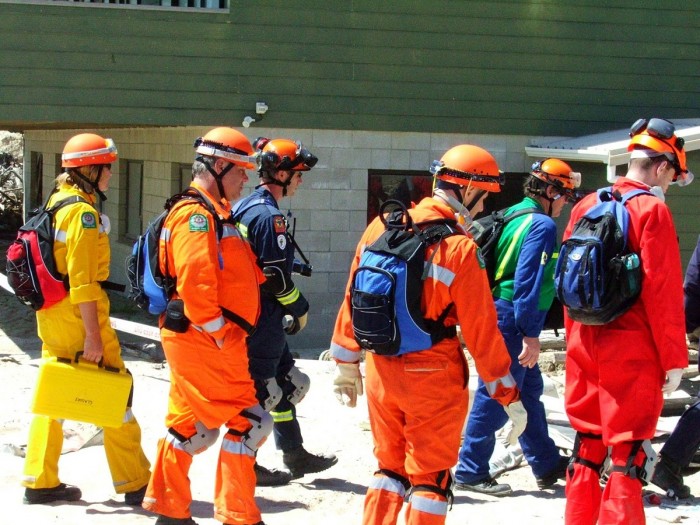Emergency Management Officer
Āpiha Whakahaere Ohotata
Alternative titles for this job
Emergency management officers plan for and respond to emergencies such as earthquakes and weather events. They also train communities to prepare for disasters.
Pay
Emergency management officers with up to three years' experience usually earn
$66K-$79K per year
Emergency management officers with three or more years' experience usually earn
$79K-$95K per year
Source: Hawke's Bay Regional Council, 2018.
Job opportunities
Pay
Pay for emergency management officers varies depending on experience, qualifications and where they work.
- Emergency management officers with up to three years' experience usually earn between $66,000 and $79,000 a year.
- After three to six years' experience they usually earn between $79,000 and $85,000.
- Senior emergency management officers with more than six years' experience or who work as team leaders can earn up to $95,000.
Source: Hawke's Bay Regional Council, 2018.
(This information is a guide only. Find out more about the sources of our pay information)
What you will do
Emergency management officers may do some or all of the following:
- develop civil defence emergency management plans
- provide advice and education on emergency preparedness to the community and local businesses
- develop disaster simulations and exercises to test operational plans
- set up and operate emergency operation centres
- liaise with emergency services such as the police
- research hazards that threaten the community
- write reports and operational procedures and policies
- organise and deliver training to staff and volunteers
- speak to the media about emergency management issues.
Skills and knowledge
Emergency management officers need to have knowledge of:
- building evacuation procedures
- potential risks and hazards
- their local community and community agencies
- emergency management legislation
- project management methods
- presentation skills and adult training methods
- risk management.
Working conditions
Emergency management officers:
- usually work regular business hours, but may be rostered on call for evenings and weekends
- are expected to be available at short notice for any emergency
- work in offices, and may work in bunkers or in the field during emergencies
- may travel nationally or internationally to attend training events, conferences or emergencies.
What's the job really like?

Jan Pryor
Emergency Management Officer
Staying calm in emergencies
Jan Pryor was a police officer for nine years before moving into emergency management and says it gave her emergency service experience and people skills that are needed for the role. "You have to be able to get along with a wide range of people and be used to dealing with emergency situations. You can't be somebody that gets stressed and goes to pieces in a crisis."
What the role involves
Being an emergency management officer is largely about preparing the community for a local emergency. Jan participates in the Police Emergency Services Co-ordinating Committee, which includes services like the police, the coast guard, St John's, and hospitals. "We make sure we are all talking the same language in the event that something happens."
Training on the job
Recently completing a Certificate in Emergency Management has deepened Jan's understanding of the job. "I've also joined the local emergency response team, which is a national urban search and rescue team and can potentially be called upon to work anywhere in the country."
Jan says her future lies in emergency management. "I'm interested in getting qualified enough to do international work with the United Nations. You can get to go around the world."
Entry requirements
To become an emergency management officer you need to have:
- a full driver's licence
- relevant work experience, such as volunteering for civil defence
- no criminal convictions.
Emergency management officers are usually trained on the job and complete short courses in emergency management subjects.
A Postgraduate Diploma in Emergency Management can be completed by distance learning to advance your career.
- Ministry of Civil Defence and Emergency Management website - information on training and courses
- Auckland University of Technology website - information about the Postgraduate Diploma in Disaster Risk Management and Development
- Massey University website - information about qualifications in emergency management
Secondary education
No specific secondary education is required for this job, but geography and social studies to at least NCEA Level 2 are useful.
Personal requirements
Emergency management officers need to be:
- calm, decisive and positive during emergencies
- able to work well under pressure
- able to work well with a wide range of people
- able to train and motivate people
- able to process complex information and solve problems quickly
- skilled at oral and written communication
- skilled at project management
- skilled at relationship management
- skilled at leadership.
Useful experience
Useful experience for emergency management officers includes:
- work for the police, ambulance services, Fire and Emergency New Zealand or New Zealand Defence Force
- civil defence work
- social work or environmental health officer work
- city council and planning work
- risk management or hazard analysis experience
- volunteer and community development experience
- search and rescue experience.
Many emergency management officers start their career as a volunteer for their local civil defence group.
Find out more about training
- Ministry of Civil Defence and Emergency Management
- (04) 817 8555 - MCDEM@dpmc.govt.nz - www.civildefence.govt.nz
What are the chances of getting a job?
Limited vacancies for emergency management officers
Opportunities for emergency management officers are average because:
- people tend to stay in the role for a long time, limiting vacancies
- the occupation is relatively small, and the number of people in the job is steady.
According to the Department of Prime Minister and Cabinet, 452 emergency management officers work in New Zealand.
Chances of finding work are best in the main centres of Auckland, Wellington and Christchurch.
Civil defence experience an advantage
Your chances of securing an entry-level emergency management officer job are best if you have good relationship building and management skills, and relevant work experience such as civil defence volunteering.
Roles expected to increase for emergency management officers
Opportunities for emergency management officers are expected to increase due to recent government plans to prepare the public for the negative effects of climate change, health epidemics and natural disasters.
Experienced emergency management officers will also be needed to train and manage volunteers.
Types of employers varied
Emergency management officers may work for:
- local and regional councils
- government departments and non-governmental agencies
- emergency services such as Fire and Emergency New Zealand
- power, transport and telecommunication companies
- large private companies.
Emergency management officers may also be self-employed.
Sources
- Christchurch City Council, 'Civil Defence Emergency Management Activity Management Plan Long Term Plan 2015-2025', 1 July 2017, (www.ccc.govt.nz).
- Department of the Prime Minister and Cabinet, 'Briefing to Incoming Minister of Civil Defence', 25 October 2017, (www.dpmc.govt.nz).
- Department of the Prime Minister and Cabinet, 'Ministerial Review, Better Responses to Natural Disasters and Other Emergencies', 17 November 2017, (www.dpmc.govt.nz).
- Macdonald, I, group manager/group controller, Hawke's Bay Civil Defence Emergency Management Group, careers.govt.nz interview, June 2018.
- Ministry of Civil Defence and Emergency Management website, accessed June 2018, (www.civildefence.org.nz).
- Newton, R, Dr, acting head of civil defence and emergency management, Christchurch City Council, careers.govt.nz interview, June 2018.
(This information is a guide only. Find out more about the sources of our job opportunities information)
Progression and specialisations
Emergency management officers may move into management roles as controllers, or into policy analyst roles.
With further training, emergency management officers may progress to work in international disaster relief work with organisations such as the United Nations and Red Cross.
Emergency management officers can specialise in a number of roles, including:
- Business Continuity Adviser/Emergency Management Adviser
- Emergency management advisers gather and analyse information to assist in the planning, development, interpretation and review of policies relating to emergency management.
- Lifeline Utility Co-ordinator
- Lifeline utility co-ordinators work with the providers of essential services such as electricity, transport and telecommunications to help services function during and after an emergency.
- Public Information Manager
- Public information managers receive, check, pass on and distribute information about emergency preparedness and emergencies.
- Welfare Manager
- Welfare managers coordinate and support the delivery of welfare services by community agencies during and after an emergency.
- Welfare Centre Supervisor/Temporary Animal Shelter Supervisor
- Welfare centre supervisors/Temporary animal shelter supervisors manage welfare centres and animal shelters that house people and animals during and after an emergency.
Last updated 8 February 2024


